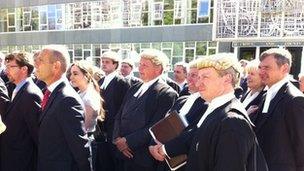Legal aid plans: Defendants 'will lose right to choose'
- Published

About 30 lawyers walked out at Plymouth Crown Court in protest at the proposals
Plans to overhaul legal aid in England and Wales would remove the right of defendants to choose a solicitor, a retired senior judge has warned.
Sir Anthony Hooper said this would have a major impact on people who needed lawyers with specialist expertise.
The Bar Council, which represents barristers, said the plans threatened a "world-renowned" justice system.
The government said the right to a fair trial would not be affected and lawyers would have to meet quality standards.
A number of groups, including charities and legal organisations, staged a protest against the plans outside the Ministry of Justice in central London on Tuesday.
Protesters waved placards reading "justice is not for sale" and "defend legal aid", chanting: "What do we want? Justice. When do we want it? Now."
Some law firms have estimated that the reforms will reduce the number of people who qualify for legal aid by 75%.
'Envy of the world'
Ministers are planning to cut £220m from the annual criminal case legal aid budget in England and Wales.
Legal aid costs taxpayers about £2bn every year and criminal defence makes up more than half of the expenditure - amounting to what the government says is one of the most expensive legal aid systems in the world.
It wants to see fewer but bigger organisations providing legal aid.
The plans include:
Introduction of price competitive tendering (PCT), where providers bid for legal aid contracts
Defendants with a disposable income of more than £37,500 prevented from having automatic access to legal aid
Curbing prisoners' rights to claim the support to pursue complaints against the prison system
Sir Anthony, who retired as a Court of Appeal judge last year, said the plans risked harming a system of fair justice that was the envy of the world.
He identified what he described as two fundamental defects resulting from PCT. One was the elimination of the long-held right of a defendant to choose a legal aid solicitor.
Under the new system a defendant will be "allocated a firm of solicitors, a lawyer or a corporate provider like Eddie Stobart, or whoever it may be", Sir Anthony told BBC Radio 4's Today programme.
He said people with a disability would not be able to choose a lawyer who understood their condition, and those involved in complex cases would not be able to seek out specialists.
"If I'm arrested in Norwich on a complex fraud case, for example, I would be able under the present system to find maybe a solicitors in London or Manchester, or wherever it may be, who specialise in difficult fraud cases," he said.
"Not now. Someone will turn up at the door and say 'I'm representing you. And by the way, I'm employed by the following company'."
He also warned that where solicitors' firms currently competed on the basis of excellence, new corporate providers would be under pressure to give advice that was in their financial interests.
'Price trumps all'
The Bar Council's comments came in its 150-page response to a Ministry of Justice consultation on the issue, which ends later.
Maura McGowan QC, chairwoman of the Bar Council, said: "There is no avoiding the simple fact that these proposals would move us from having a justice system which is admired all over the world, to a system where price trumps all."
The Bar Standards Board, which is responsible for regulating barristers, said the plans to pay legal aid lawyers the same amount for a "guilty" or "not guilty" plea could lead to defendants being pressurised into pleading guilty.
It said cases where the defendant entered an initial guilty plea were typically shorter and so cheaper.
Chairwoman Baroness Ruth Deech said: "These reforms may endanger the ability of our legal system to guarantee everyone a fair trial. "
The Association of Prison Lawyers said the plans would effectively remove legal aid for all prison law issues other than parole hearings and disciplinary hearings dealt with by magistrates.
"The changes will mean that funding will no longer be available for such important matters as the separation of mothers and babies, prisoners being held in solitary confinement and access to rehabilitative programmes," it added.
The Children's Society says it is particularly concerned by the proposed introduction of a residency test to determine eligibility.
Chief executive Matthew Reed said: "These proposals will see the UK block access to legal aid for vulnerable children, undermining their rights and leaving some of the most marginalised young people without help."
Justice Secretary Chris Grayling said: "At a time of major financial challenges, the legal sector cannot be excluded from the government's commitment to getting better value for taxpayers' money.
"We believe costs paid to lawyers through legal aid should reflect this."
The Ministry of Justice added that a disposable income cap of £37,500 per household would mean only those on a six-figure salary or above would be prevented from having automatic access to legal aid.
Labour's shadow justice secretary Sadiq Khan said there was "considerable waste and bureaucracy" in the criminal justice system.
"But the government's proposals ignore these potential savings, and instead impose a model for legal aid which prioritises the cost of legal representation ahead of quality."
In April, the Legal Aid, Sentencing and Punishment of Offenders Act removed legal aid from many areas of civil law.
- Published4 June 2013
- Published9 April 2013
- Published4 April 2013
- Published1 June 2013
- Published31 May 2013